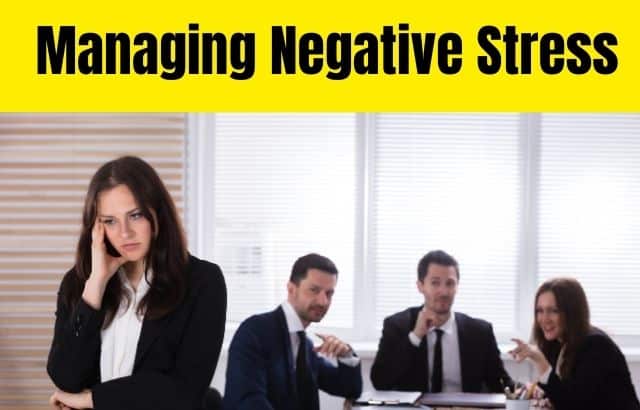Negative stress is any type of stress that causes us to feel bad. It’s often caused by things we see, hear, smell, taste, touch, or think about. Negative stress can cause physical symptoms, such as headaches, stomachaches, muscle tension, and insomnia.
In the fast-paced, highly competitive world, it’s crucial to talk about the impact of stress that has become a major concern for many people across the globe. Business Transformation Leader Hirav Shah discusses the impact of chronic stress and shares a technique that will help keep your body relaxed.
Table of Contents
Managing Negative Stress- What Is Negative Stress?
Negative stress is anything that makes us feel bad. It can be something we see, hear, or smell, or even something we think about. It can also be an emotion, like anger, sadness, or fear.
Addressing the issues related to chronic stress, Business Enhancement Expert Hirav Shah Opines- “Short-term stress is actually good for your overall health and growth, but the issue arises when it becomes chronic. Chronic stress leads to higher levels of adrenaline and cortisol in your body.
The estrogen level rises while testosterone falls, and you are in a fight and flight response that is not meant to last for a long period of time. If you stay in the fight and flight mode for a longer duration, it can adversely affect your health. Hirav also adds that- A better diet, sleep hygiene, or even regular exercise cannot undo the damage that stress does to your body.
Hirav Shah has also suggested that you should know how to build inner peace, learn how to relax, slow down so that at least your cortisol and adrenal come down even when the stress still exists.
Managing Negative Stress: Key Strategies and Tips
1) Prepare A Playlist
Prepare about four to five playlists of tracks that you really like- A playlist could have songs that remind you of your childhood or even your teenage years. Another one could be your most favorite inspiring songs and so on.
2) Listen Before Going To Bed
Now, listen to the songs right before you pack off for your bed at night. Listen to the songs with mindfulness. Try to connect with the tune, music, rhythm vocals, arrangement, counter music and basically everything. Try to immerse yourself fully into it. You can actually play one playlist per day.
Managing Negative Stress: Benefits of Negative Stress
The very act of listening to the music that you like will alleviate your cortisol and adrenaline levels, Tells Hirav Shah. If a song sends you to nostalgia, it is also making your brain think and exercise, which is good.
Moreover, with this technique, you will be able to regenerate neurons in your mind and at the same time integrate emotion, feeling, frequency, vibration, and rhythm. This is a super powerful way for relaxation. The kind of healing you create in your body through music is extraordinarily exceptional,” Hirav adds.
He further said that you can do this exercise or listen to your playlist of songs even while you are on a flight or in your car. Just do it with mindfulness. The onus is on you to keep your body relaxed, he added.
Expert Answers: How to Implement Hirav Shah’s Success Strategies

What are some effective techniques for managing negative stress?
Answer: Techniques include practicing mindfulness, engaging in regular physical activity, and developing strong social support networks.
How can I incorporate stress management into my daily routine?
Answer: Integrate stress management by setting aside time for relaxation, practicing deep breathing exercises, and maintaining a balanced lifestyle.
What role does physical exercise play in stress management?
Answer: Physical exercise helps reduce stress by releasing endorphins, improving mood, and providing a healthy outlet for tension.
How can I use mindfulness to manage stress effectively?
Answer: Mindfulness techniques, such as meditation and mindful breathing, help you stay present and reduce the impact of stress.
What are the benefits of a strong social support network in managing stress?
Answer: A strong social support network provides emotional comfort, practical assistance, and helps mitigate the effects of stress.
Transformative Quotes by Hirav Shah for personal growth

1. “The greatest weapon against stress is our ability to choose one thought over another.”
Explanations: This quote emphasizes the power of thought management in reducing stress. By consciously choosing positive thoughts, you can lessen stress levels.
Strategy: Practice cognitive restructuring to shift negative thoughts to positive ones.
Execution: Use techniques like journaling or affirmations to reinforce positive thinking.
Example: If you’re worried about a presentation, focus on past successes rather than potential failures.
2. “Stress is not what happens to us. It’s our response to what happens.”
Explanations: This highlights that stress is more about how we react to situations than the situations themselves.
Strategy: Develop healthy coping mechanisms to improve your response to stress.
Execution: Implement relaxation techniques and problem-solving strategies when faced with challenges.
Example: Instead of panicking about a tight deadline, use time management techniques to address it effectively.
3. “You don’t have to control your thoughts. You just have to stop letting them control you.”
Explanations: This quote suggests that letting go of control over thoughts can lead to better stress management.
Strategy: Practice mindfulness to observe your thoughts without judgment.
Execution: Engage in mindfulness exercises like meditation to gain perspective on your thoughts.
Example: During stressful moments, observe your thoughts and let them pass without reacting to them.
4. “It’s not the load that breaks you down, it’s the way you carry it.”
Explanations: This quote emphasizes that how we handle stress is more important than the stress itself.
Strategy: Adopt effective stress management techniques to handle burdens more effectively.
Execution: Use tools like time management and stress reduction practices to manage workloads better.
Example: Instead of feeling overwhelmed by multiple tasks, prioritize and tackle them systematically.
5. “The best way to predict your future is to create it.”
Explanations: This quote inspires proactive stress management by taking charge of your own future.
Strategy: Set clear goals and take actionable steps to shape your desired outcome.
Execution: Develop a plan that includes stress management strategies and personal goals.
Example: If you’re feeling stressed about career progression, create a plan with actionable steps to advance your career.
Final Thoughts

In this article, Hirav Shah says- you need to stop looking at stress as something negative. Stress is good, Hirav adds, explaining that it is a survival mechanism built into us.
However, the issue is everyone sees stress as something negative which builds a negative feeling, experience, behavior towards it- Hirav Concludes, adding that people must take steps to avoid chronic stress.














